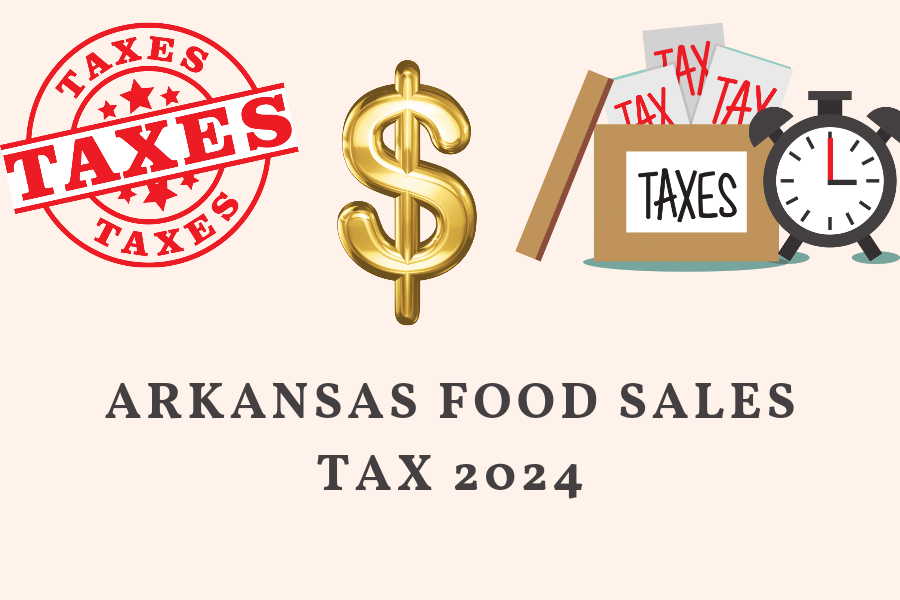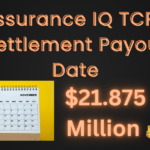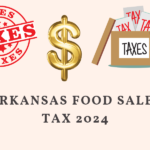In the United States, the food sales tax is a tax amount that will be imposed on the sale of food items. The food sales tax rate depends on the location of living. In Arkansas, the food sales tax reduced rate is 0.125%. To know about the Arkansas food sales tax rark 2024, calculation, eligible items, implementation, effects, and other details read the full article.
Arkansas Food Sales Tax 2024
A food sales tax is a type of consumption tax that is usually imposed by the government on the sale of food items. The food sales tax is basically calculated as a percentage of the retail price and is collected at the location of sale. The main objective of a food sales tax is to generate revenue for the government after that the collected revenue will be used to fund public services and infrastructure. The food sales tax is applicable for different types of food like groceries, prepared meals, and beverages. However, the exact food sales tax rates will be implemented by state or country.
Many states in the United States provide exemptions or reduced rates for specific food items to reduce the financial burden on consumers, especially from low-income families. For instance, in Arkansas, groceries and other food items are taxed at a reduced rate of 0.125%. Retailer shops are responsible for gathering the food sales tax from customers at the purchasing time and then remitting it to the local government. In short in 2024, the sales tax on food in Arkansas remained lower than the general sales tax rate. On the Food items purchasers only need to pay 0.125%.
In the past few years, a bill was introduced to eliminate this food sales tax, but it has yet to pass. Some types of food also face exemptions from the state’s food sales tax. For instance, food purchased with Supplemental Nutrition Assistance Program (SNAP) benefits is exempt from the 0.125% sales tax on food. Beverage tax in Arkansas is $2.50 per gallon of Liquor, $0.75 per gallon of Wine, and $0.23 – $0.77 per gallon for Beer. The exact beverage tax in Arkansas basically depends on the alcohol content.
Eligible Food Items for Arkansas Food Sales Tax
In Arkansas, the reduced food sales tax of 0.125% applies to all the groceries-related items that can be utilized for home consumption. The list of a few eligible food items that need to pay reduced food sales tax in Arkansas is provided below.
- Baby food (like baby milk powder, cereal and formula, etc. )
- Bakery items (unheated)
- Bread (unheated or unbaked)
- Baking ingredients (chocolate chips, baking flour, baking powder, artificial flavors, etc.)
- Cereal and cereal products
- Condiments (like ketchup, mayo, mustard sauces)
- Deli meats and cheeses (not heated, combined, or served by the seller)
- Eggs and egg substitutes
- Fish and seafood (must be in the form of raw, frozen, canned)
- Fruit and fresh fruit juices (must be fresh, frozen or canned)
- Milk, yogurt, and cheese products
- Pasta and noodles
- Vegetables and vegetable products (need to be fresh, frozen or canned)
The purchaser of other food items like candy, soft drinks, and prepared foods that are sold at restaurants must pay the full state sales tax rate of 6.5%.
Is there a maximum amount of groceries that can be exempted from tax?
The Food sales tax in Arkansas is typically applied to the sale of food and beverages. The food sales tax includes both prepared foods (like restaurant meals) and unprepared foods (like groceries and other food items). In Arkansas, there is no limit applied on the number of purchased groceries that can be exempted from tax. The reduced food sales tax rate of 0.125% is applicable for all eligible grocery purchases instead of the total amount spent. However, keep in mind that specific items like candy and soft drinks must need to pay the full state sales tax rate of 6.5%.
How can you calculate the Food Sales Tax?
Americans want to know how they can calculate the food sales tax rate of their living state? Calculating food sales tax involves a few below-listed steps.
- Determine the Tax Rate: Find out the applicable food sales tax rate in your current living area or State. This can be different based on the state, county, or city.
- Identify Taxable Items: All food items will not be subject to food sales tax. Usually, prepared foods are taxed, while unprepared foods might be exempt or taxed at a lower rate than the federal food tax rate.
- Calculate the Tax: Multiply the price of the taxable food item by the current food sales tax rate. For instance, if the food sales tax rate is 5% and the food item costs $10, the sales tax would be $0.50.
- Add the Tax to the Total: Add the calculated taxed price to the real price of the food item to increase awareness about the total cost. According to the previous example, the total cost of purchased items will be $10.50.
Who needs to pay the Food Sales Tax in Arkansas?
It is a very important question to those who need to pay the food sales tax in Arkansas and everyone wants to know about its answer. The food sales tax rate in Arkansas is 0.125% in 2024. The responsibility of paying the food sales tax is for retailers or the business that conducts the sale. The retailer must collect the food sales tax from the purchasers at the point of sale and then remit it to the Arkansas Department of Finance and Administration (DFA). That’s why, The retailer is responsible to include the food sales tax rate in the price of the actual food items.
Impact of Food Sales Tax
The food sales tax rate leaves several positive or negative impacts on customers. The higher rate of food sales tax also changes consumer behavior. The other effects of food sales tax are listed below.
Economic Burden on Low-Income Households
Food sales taxes affect low-income households in the United States. A higher food sales tax rate can lead to higher food insecurity because families need to spend a larger portion of their income on groceries or other food.
Change Consumer Spending Habits
Sales Taxes on food have seriously impacted how consumers spend their money. For example, higher taxes on groceries might encourage individuals to eat food often. The higher rate of food sales tax also changes customers’ spending habits it means they prefer restaurant food instead of home-cooked food which can lead the nutritional implications because restaurant foods are often less healthy.
Revenue for Public Services
The food sales tax amount provides a generated revenue to the government from eligible food sales taxed items. The collected amount from the food sales tax can be used to fund essential public services like education, healthcare, and infrastructure.
Increase Price Sensitivity
When the cost of food increases due to the higher food sales tax rate then consumers may become more price-sensitive. Because if this customer can only buy less expensive or fewer items. The lesser sale of food becomes a serious issue for sellers because their items may expire and be wasted.
Economic Impact
The changes in consumer behavior because of food sales tax can impact local businesses and the broader economy. Less spending on sales-taxed food items can lead to lower sales for retailers affecting the employment in the food industry and it will cause major damage to the economy of the country.
Is Arkansas Food Sales Tax applicable to the restaurant’s food?
In short, yes, in Arkansas, the full state food sales tax rate of 6.5% is applied to prepared food that is sold at restaurants and in fast-food chains. This may be frozen, fresh, and canned meals, beverages, and several other prepared food items. The reduced food tax rate of 0.125%, applicable in Arkansas normally applied to the groceries and other food items that can be used by a household.










